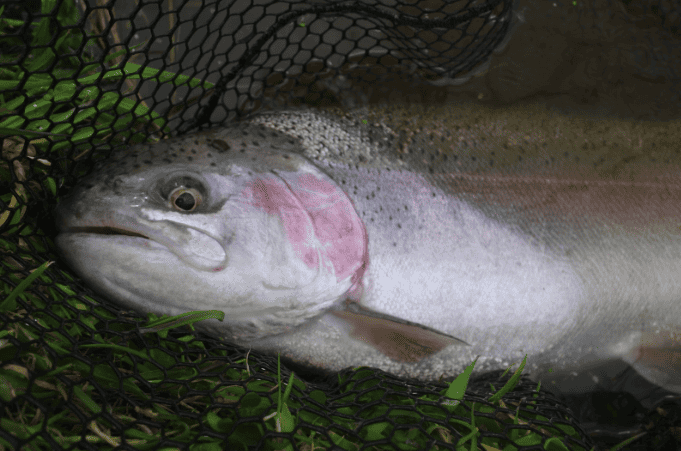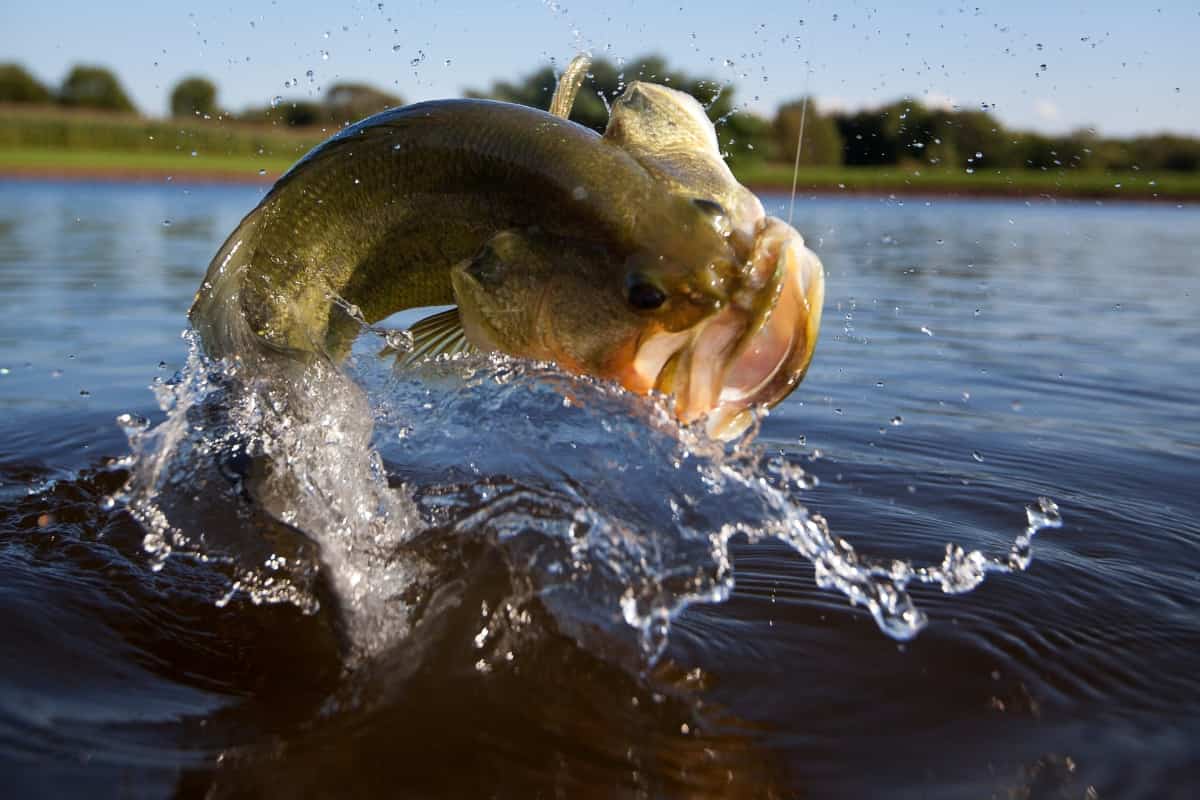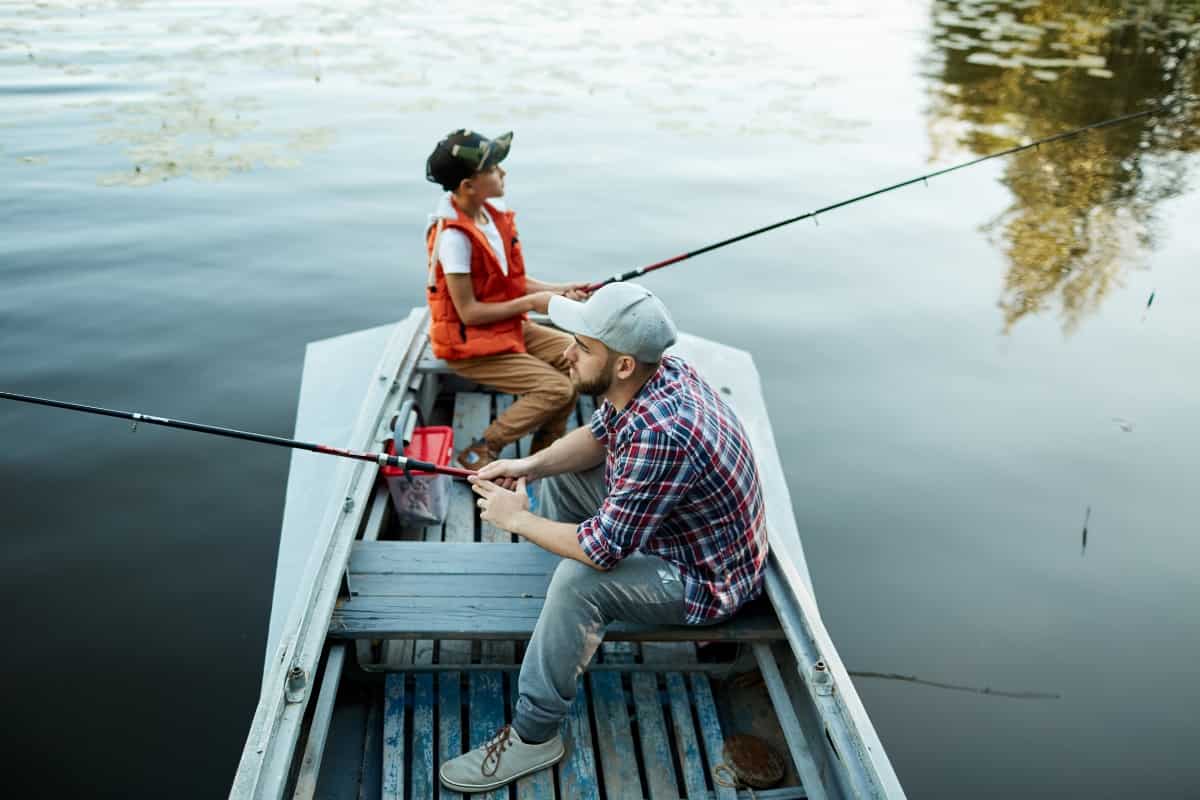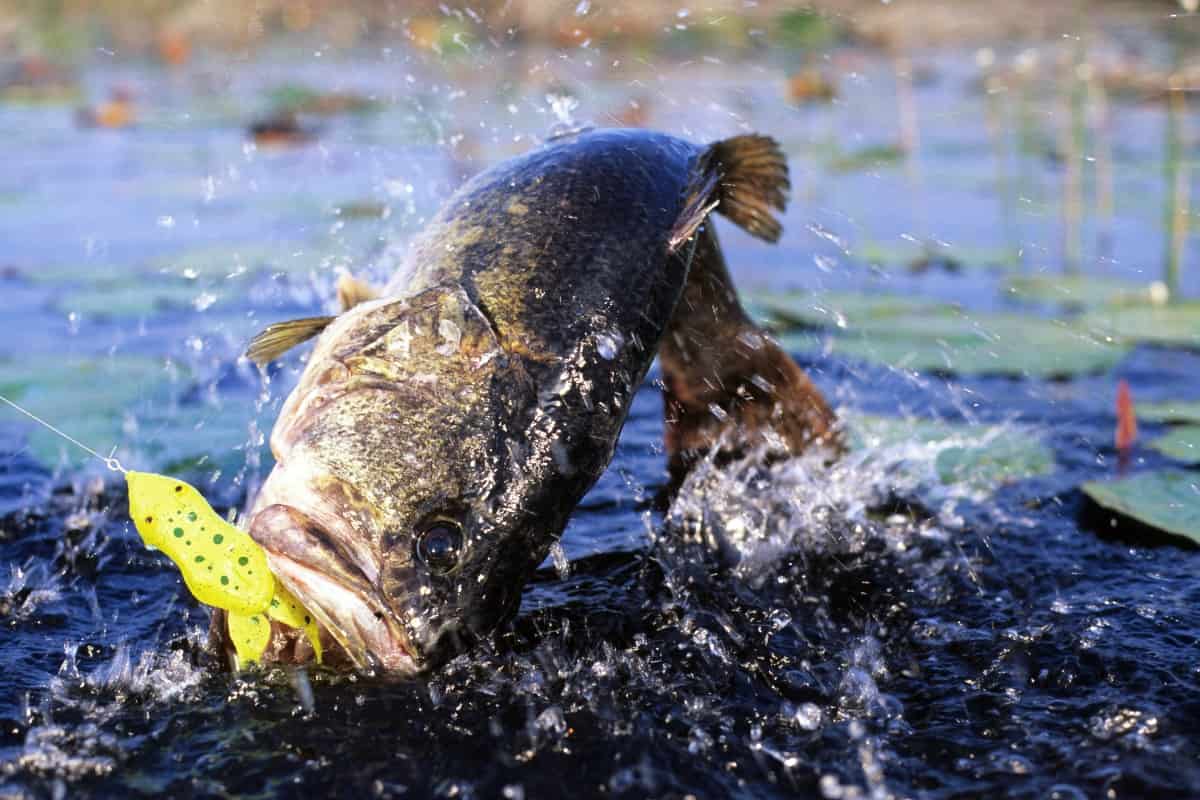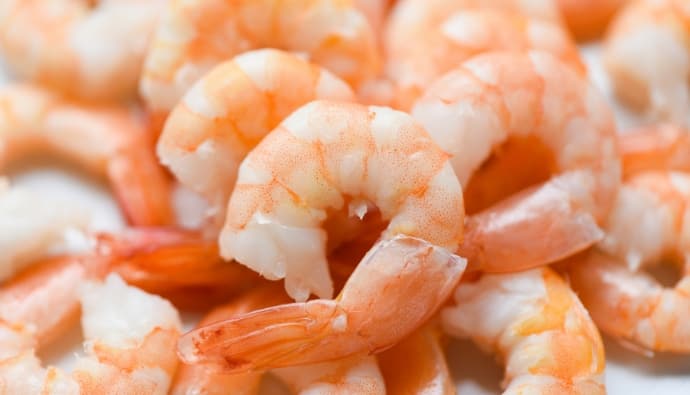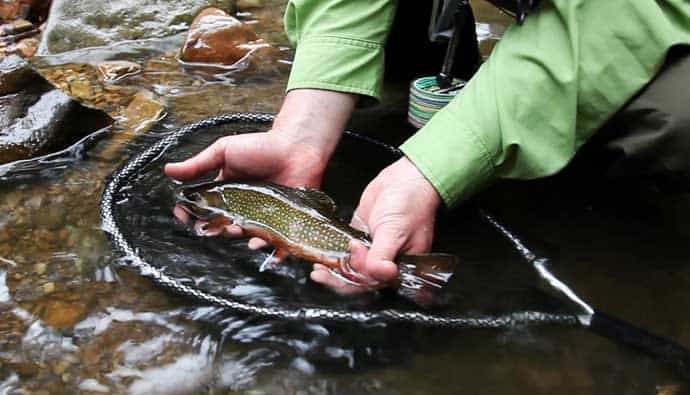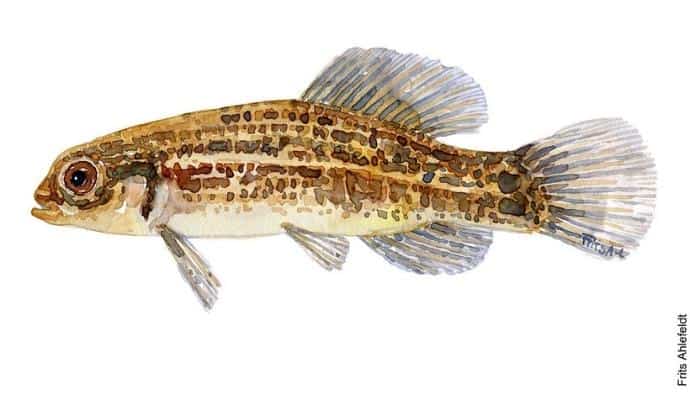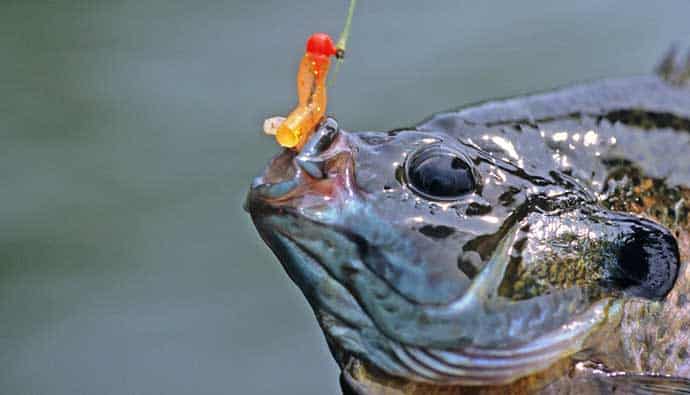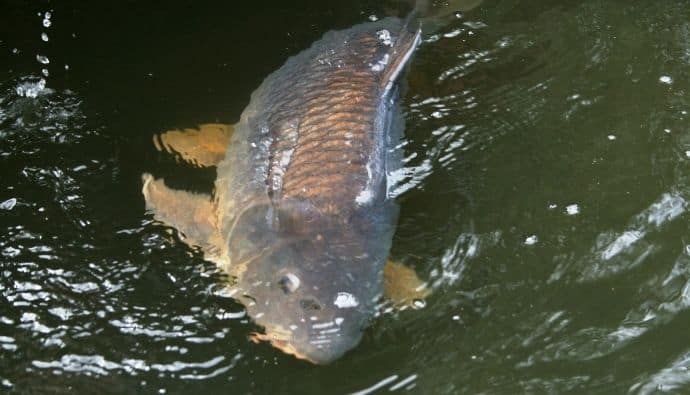The Papuan Black Bass should be on your shortlist of dream fish to target.
Made famous in River Monsters season 9 episode 15, this large fish is rare and can reach an impressive 40” in length and can weigh over 44 lbs.
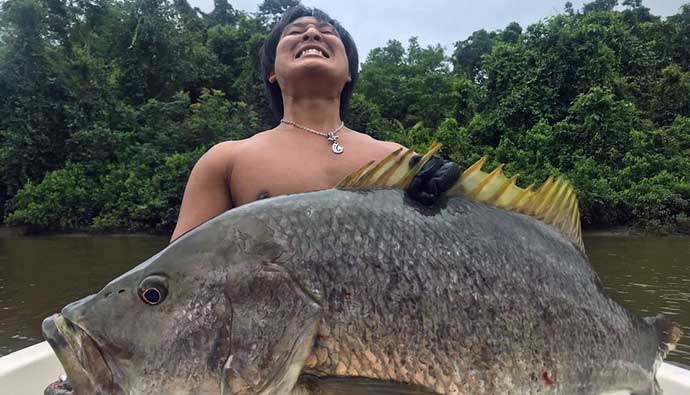
If Jeremy Wade can catch one, so can you!
Let’s learn how.
Recommended Papuan Black Bass Gear:
- Rod: Penn Carnage II
- Reel: Penn Battle III
- Lures: Halco Scorpions
- Tackle: Mustad 5x Treble Hooks + Stainless Steel Split Rings
Overview
Mention the ferocious Papuan black bass, and you will turn heads. Also known as the largemouth bass, this river monster is not actually a bass at all. It’s a snapper.
The black bass can be found in southeastern Papua, New Guinea, from Moresby port to the Fly River. The fish inhabits large freshwater jungle streams and tributaries. It is grey/black in color and has one or two blue lines under the eye on its cheeks.
Like other lutjanids, the black bass has powerful jaws and sharp teeth.
Papuan Black Bass Facts
| Scientific Name | Lutjanus goldiei |
| Common Name(s) | Papuan Black Bass |
| Family | Lutjanidae |
| Identifying Characteristics | It is grey/black in color and has one or two blue lines under the eye on its cheeks. Like other lutjanids, the black bass has powerful jaws and sharp teeth. |
| Depth Range | 7 m |
| Habitat | The black bass can only be found in southeastern Papua, New Guinea, from Moresby port to the Fly River. It can be found all the way in Malaysia. |
| Limits | Check your local regulations |
Papuan Black Bass Habitat
Also known as mogilo fish, the Papuan Black Bass remains in the deeper parts of rivers in Papua. They are in areas that have plenty of heavy weeds, timber, sunken structures, and rock bars. These provide excellent cover for ambush attacks on prey. The fast-flowing water brings food straight to where the bass is hiding.
How to Catch Papuan Black Bass

The black bass is known for being a vicious fighter and can take hours to tire out. If you want to land this river monster, you have to treat it with the respect it deserves by using high-quality tackle. Plus, the treble hooks and split rings don’t get mangled when the bass strikes.
Most anglers cast with surface plugs or shadow and medium plugs, but a good number go for it fly fishing.
The fish will try and run for cover once it is hooked, so make sure that you use a strong short rod, robust reels with top-quality drag, and heavy leaders.
Papuan Black Bass Fishing Tactics
- The black bass is a strong fighter, so make sure that you take nothing less than a 50lb tackle as well as an 80b outfit, just in case.
- The rip and pause method of working lures is the best way to get reaction strikes from the black bass.
Quick Tips for Catching Papuan Black Bass
- If you are fishing in a river where your line may snag, use weedless soft plastics for lures and a worm hook that won’t let it slip off.
- The black bass will not waste its time lunging towards small lures, so use big ones to increase your chances of catching it.
Papuan Black Bass Seasons
Like most bass, the best time to catch it is during the early morning hours or late in the evening. At those times, the temperature of the water compels other fish to come out, which the bass preys on.
How to Clean Papuan Black Bass
Note: Locals have been known to catch younger black bass to eat. Larger specimens that are targeted by sport fishermen should be released.
However, if you choose to eat a smaller one, here are some recommendations:
- Place the black bass belly side towards you on a clean cutting board.
- Make a cut down into the fish behind the pectoral fin, and stop cutting when you reach the backbone.
- Rotate the fish, and starting at the backbone, cut through the skin using the tip of the blade. Cut until the back of the dorsal fin to the point at which the ribs attach to the backbone.
- Insert the knife all the way in and make it come out through the belly, and continue the cut toward the back till the knife exits through the tail.
- Lift the fillet and use the tip of the knife to detach it from the ribs. Work from the back and follow the rib cage as you cut towards the belly.
- Separate the fillet from the body by cutting through the belly. Flip the fish and repeat the steps to take out the second fillet.
How to Cook Papuan Black Bass
- Heat some oil in a large nonstick skillet over medium-high heat.
- Season the fish with salt and pepper.
- Put the fillets in the heated oil till the skin turns golden brown and crisp. This shouldn’t take more than 5 minutes.
- Flip the fillets and add some olives, 2 thinly sliced garlic cloves, and 1 tablespoon of rosemary. Keep cooking till the fish turns opaque throughout. Take out the fish on a plate.
- Add half a cup of orange juice to the pan and swirl to create a nice vinaigrette.
- Drizzle on the fish and serve with lemon wedges.
Frequently Asked Questions
Q: Why is the Papuan black bass a rare catch?
A: While locals do catch juveniles for food, the adults not only fight back when they are netted or hooked, but they also bite and will come for you if you aren’t quick enough to get out of the water. Yet, if you are on a boat with experienced natives and anglers, you should just catch it for a photo op and then release it.
Q: How large can the Papuan black bass get?
A: At its largest, this New Guinea black bass can grow to weigh 70 lbs, but most don’t grow more than 44 lbs.
Q: How can I dispatch a Papuan black bass humanely after catching it?
A: A firm knock to the head will do, and place the fish in an ice slurry immediately after that.
Insider Advice
So the next time you are planning to holiday in Papua New Guinea, take your heavy fishing gear with you and try your hand at catching this river monster. Don’t forget to upgrade all of your tackle.
Don’t underestimate this fish!




 Facebook
Facebook YouTube
YouTube